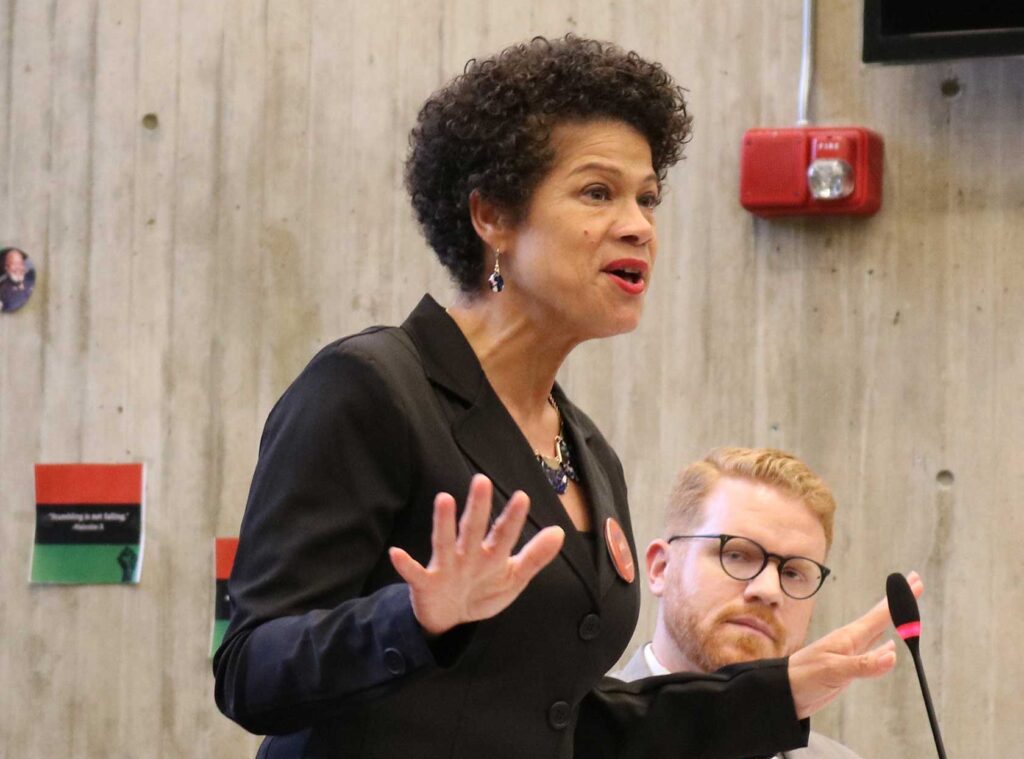
A city office that focuses on the needs of residents in historically marginalized communities in Boston is moving one step closer to fruition.
The Boston City Council earlier this month approved the creation of the Office of Cultural Affairs, which would center its work on Boston residents who are Latin American, Caribbean, and Asian and Pacific Islanders.
The proposed office would coordinate constituent services, steer residents to grants and better serve people who historically have not had real connections with the city, according to members of the Council.
Those members who sponsored the ordinance — Councilors Julia Mejia, Ricardo Arroyo and Brian Worrell — said the office would be a boon for the city. Mayor Michelle Wu will need to sign off on it to make it official, Mejia said.
“In the city of Boston, we have a large population of Latino and Caribbean folks, and oftentimes, there isn’t a central location for this demographic to have their needs met,” said Mejia.
The mayor’s office said officials are currently reviewing the ordinance the council passed.
The push for the new office emerged this summer when Mejia, Arroyo and Worrell — who were either born in the Caribbean or have Caribbean-born parents — proposed creating an office of Latino and Caribbean affairs to address the public health and welfare needs of Boston residents who were born in Caribbean and Latin countries.
Mejia previously told the Banner that the idea for a Latino-Caribbean-focused office emerged after a hearing last year in which residents complained that they faced language barriers when dealing with city services and experienced a large wage gap compared with other ethnic groups.
“Latinos and Caribbeans often feel like they’re an invisible minority because they really don’t have a space or place that sees them and their concerns,” Mejia told the Banner previously.
The newly proposed Office of Cultural Affairs aims to change that narrative.
Its mission has broadened to also center support around others who have been historically marginalized, including residents who are Cape Verdean and Asian and Pacific Islanders.
The new office would be made possible with the expansion of the Office of Immigrant Advancement, which, according to the city’s website, strives to strengthen the ability of immigrants to fully and equitably participate in Boston’s economic, civic, social and cultural life.
Boston is a city full of foreign-born residents of color. Caribbean residents hail from places like Haiti, Jamaica, and Trinidad, and Latino residents from the Dominican Republic, Bolivia and El Salvador. Asian and Pacific Islanders come from countries like Vietnam, Korea and China.
Mostly, these residents are the engines of a thriving city, forming a bulk of the labor force and populating neighborhoods like Mattapan, parts of Dorchester and Hyde Park. (Puerto Ricans, who represent a chunk of the city’s Latino population, are U.S. citizens, though they also are a good slice of the city’s Caribbean community).
Both Mejia and Arroyo signaled hope for the cultural affairs office.
“There was some desire to have a space … for people to be able to navigate city services, policies and programs that are unique to this specific population,” said Mejia, who is from the Dominican Republic.
Arroyo, whose family is from Puerto Rico, said the aim was not to replicate what the city has. The city’s Haitian, Cape Verdean, and Latino cultural liaisons in the Office of Neighborhood Services already connect with people in the neighborhoods.
The Office of Cultural Affairs will be something more, he said.
“What we’re going to do is … restructure [that experience] so that instead of working under the Office of Neighborhood Services, those cultural liaisons [will] now move into this new office,” he said.
The office also will have its own executive director who will do direct outreach “specifically to those communities, in both a proactive and reactive way,” Arroyo said.
Arroyo said there were many obstacles standing in the way of the proposed cultural affairs office, including figuring out how to narrow the role and responsibilities of the office, making a case for historically excluded communities to better engage within the political system and getting other councilors to support the effort.
“[We needed to make] sure that everybody was on the same page about what specifically this office would do,” Arroyo said.
Mejia pointed to the “fight” of navigating the bureaucracy of City Hall to get things accomplished, noting the struggles she has had getting the Office of Black Male Advancement and the Reparations Task Force off the ground.
“This was no different in terms of getting to the finish line, because there is this belief that … we don’t need another office or we don’t need another department,” Mejia said. “That is the narrative when it comes [from] identifying things that are specific to certain populations.”
Arroyo said people want to go to an office where the staff members speak their language, look like them and are culturally sensitive. He said he hopes the new office will be a national leader in addressing the concerns of historically excluded communities.
“Systemic racism has done incalculable harm,” he said in a press release. “This office will begin the work of reversing that harm.”






